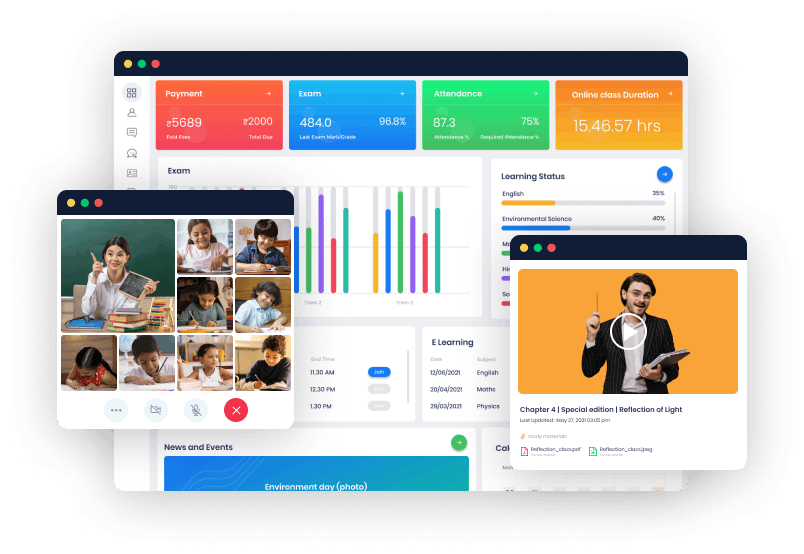eSchool for Higher Education: Managing Colleges and Universities

In today’s fast-paced digital world, technology is transforming the way we educate and learn. The integration of eSchool systems into higher education institutions is a game-changer. It’s not just about digitizing traditional classrooms; it’s about enhancing the overall learning experience and administrative efficiency. Let’s explore how eSchool , A school management system can be adapted for use in colleges and universities, addressing their unique needs.
The Need for Transformation
Higher education institutions face a multitude of challenges, from administrative burdens to providing a quality education to an increasingly diverse student body. These challenges call for innovative solutions, and eSchool offer just that. They can streamline various processes, making the management of colleges and universities more efficient and effective.
Administrative Simplification
One of the most significant benefits of eSchool as a leading school management system Pakistan in higher education is administrative simplification. Handling admission, registration, and record-keeping can be a logistical nightmare in large institutions. eSchool management systems allow these tasks to be automated, reducing the potential for errors and ensuring data accuracy. This not only saves time but also makes life easier for administrators and students alike.
Read more here
Customizable Learning Environments
Every student has a unique learning style. eSchool can provide a platform for professors to tailor their teaching methods to meet the diverse needs of their students. Whether it’s through interactive modules, discussion forums, or personalized feedback, eSchool enable a more engaging and customized learning experience.
Data-Driven Decision-Making
Institutions of higher education produce vast amounts of data, from student performance to financial records. eSchool systems are equipped to collect, process, and analyze this data, providing valuable insights for decision-makers. These insights can lead to better resource allocation, improved teaching methods, and informed strategic planning.
Enhanced Communication
Effective communication is vital in any educational institution. eSchool facilitate seamless communication between students, faculty, and staff. With features like messaging systems and discussion boards, collaboration becomes more straightforward, fostering a sense of community and engagement.
Tailoring eSchool for Higher Education
While eSchool system offer numerous advantages, their adaptation to higher education requires careful consideration. Let’s delve into some key aspects of tailoring eSchool for colleges and universities.
Scalability
Large universities and small liberal arts colleges have different needs, and the scalability of eSchool management system is crucial. Whether you’re managing a few hundred students or tens of thousands, the system should be able to grow with your institution. Customization is key, as it ensures that the eSchool platform aligns with the unique requirements of each institution.
Security and Privacy
Higher education institutions handle sensitive information, from student records to financial data. Robust security measures are non-negotiable. Data breaches can have severe consequences, not only for the institution but also for the students. eSchool software must prioritize security and privacy, implementing the latest encryption and access control measures.
Integration with Existing Systems
Colleges and universities often have legacy systems in place. Compatibility with existing software and databases is essential. eSchool should be designed to seamlessly integrate with these systems, allowing for a smooth transition to digital management.
User Training and Support
Transitioning to eSchool software can be challenging for both faculty and students. Adequate training and support are critical. Higher education institutions should invest in training programs to ensure that users are proficient in using the eSchool platform. A dedicated support system can address any issues or concerns that may arise.
The Student Perspective
eSchool in higher education aren’t just about streamlining administrative processes. They also enhance the student experience. Let’s take a closer look from the student’s perspective.
Flexibility
eSchool provide students with flexibility in their learning journey. They can access lectures and course materials at their own pace, making it easier for those with part-time jobs or other responsibilities. This flexibility also caters to the needs of international students or those in remote areas.
Improved Engagement
Engagement is a critical factor in the learning process. eSchool offers various tools for engagement, from interactive quizzes to online discussions. Students can participate actively in their education, ask questions, and collaborate with peers.
Accessibility
eSchool cater to students with disabilities by offering various accessibility features. From screen readers to captioning for videos, these platforms ensure that all students can access the educational content equally.
Real-Time Feedback
Students no longer have to wait weeks for their grades. eSchool software enables professors to provide real-time feedback, allowing students to track their progress and make necessary improvements.
Challenges and Future Developments
As with any technological advancement, eSchool for higher education are not without their challenges. The shift to eSchool requires substantial investments, both in terms of finances and training. Faculty may also need time to adapt to the new system fully.
In the future, we can expect even more advanced eSchool as a leading school management system with improved AI integration. These systems could offer more personalized learning experiences, predict student needs, and optimize course scheduling. As technology continues to evolve, eSchool in higher education will continue to adapt and innovate.
Conclusion
eSchool software is a transformative force in higher education. This simplify administrative tasks, enhance the learning experience, and provide valuable data for decision-makers. Tailored to the unique needs of colleges and universities, eSchool can revolutionize the way these institutions operate. While challenges exist, the potential benefits far outweigh the drawbacks. With careful planning, training, and investment, higher education institutions can harness the power of eSchool to provide a better education for all.
Author Bio:
Rabia is an education expert with a passion for technology e.g. school management system in learning. With years of experience in both traditional and online education, she has a deep understanding of the changing landscape of higher education. Rabia is dedicated to exploring innovative solutions to make education more accessible and effective in the digital age.



